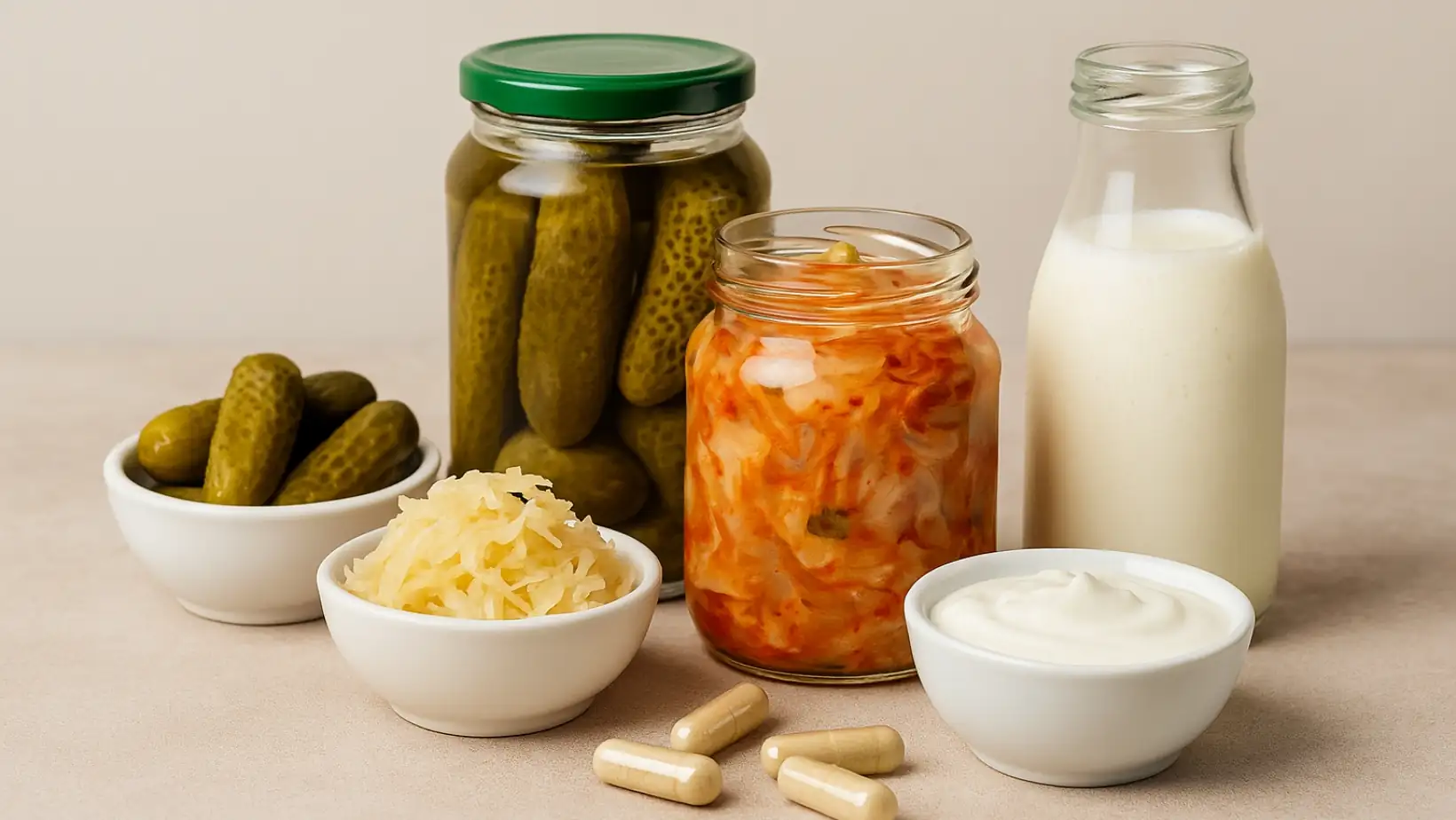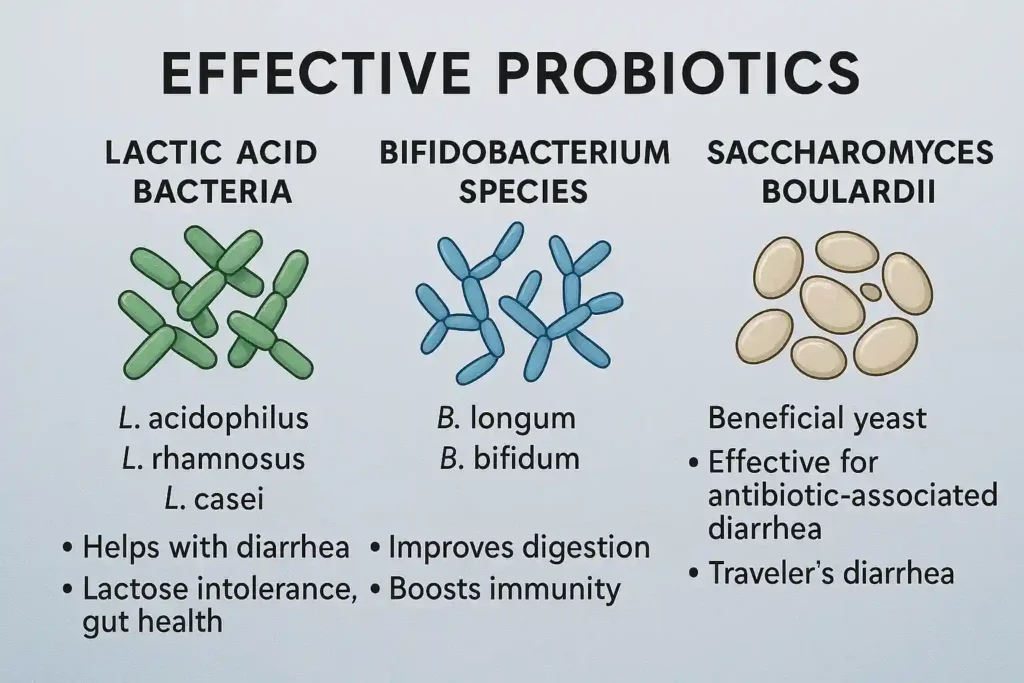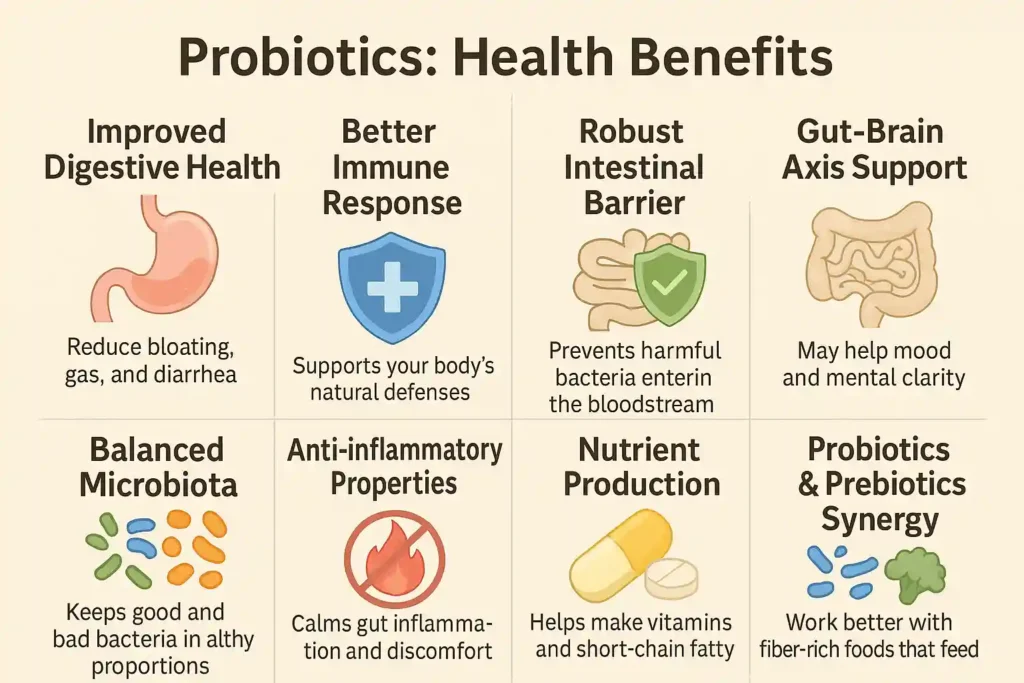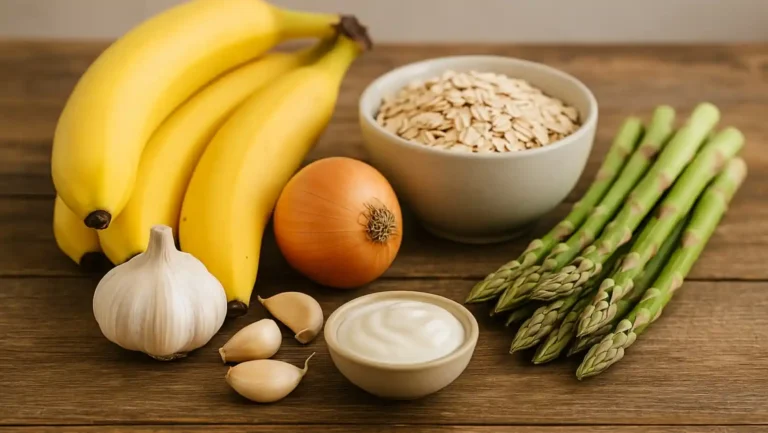Overview
What are probiotics?
Probiotics are live, friendly microorganisms that, when taken in the right amount, help keep your gut healthy. They are mostly bacteria but can also include some yeasts.
Inside your gut, trillions of bacteria live in a community known as the gut microbiota. When this community is balanced, your digestion, immunity, and overall health improve. When it’s unbalanced, you can experience gas, bloating, constipation, diarrhea, and even lowered immunity.
Probiotics can be found in particular foods like yogurt, kefir, sauerkraut, kimchi, and miso. They are also available as dietary supplements in capsules, powders, and liquids. Each probiotic strain is different, some work best for digestion, while others may help immunity or specific health concerns.
What do probiotics do?
Probiotics restore and maintain the right balance of bacteria in your gut. This balance is key for good digestion, nutrient absorption, and strong immunity.
They also help your gut produce vitamins and compounds like short-chain fatty acids (SCFAs), which feed intestinal cells and support overall health. In short, they keep your gut ecosystem in harmony.
When are probiotics recommended?
Doctors often recommend probiotics after a course of antibiotics. Antibiotics kill both good and bad bacteria, leaving your gut out of balance. This is what are probiotics used for most often, restoring a healthy gut environment.
They are also recommended for:
- Digestive health issues like diarrhea, constipation, bloating, and gas.
- People with weakened immunity, to help maintain healthy gut bacteria.
- Individuals with certain skin conditions, such as eczema, where gut health may play a role.
- Those under high stress, since stress can disrupt the gut microbiota.
- People with poor diets are low in fiber and fermented foods.
However, not every situation needs probiotics. A healthcare professional can help decide if they are right for you based on your symptoms, diet, and medical history.
Which probiotics are effective?
Probiotics are not all the same; different strains provide various benefits. The most studied and effective probiotics include:
- Lactic acid bacteria: Especially Lactobacillus species like L. acidophilus, L. rhamnosus, and L. casei, which help with diarrhea, lactose intolerance, and gut health.
- Bifidobacterium species: Such as B. longum and B. bifidum, known for improving digestion and boosting immunity.
- Saccharomyces boulardii: A beneficial yeast effective for antibiotic-associated diarrhea and traveler’s diarrhea.
When selecting the most suitable probiotic, consider the following:
- Specific strains proven for your health concern.
- Adequate CFU (colony-forming unit) counts for effectiveness.
- Packaging that protects live bacteria until they reach your intestines.
- Third-party testing for quality.
Risks / Benefits
What are the potential health benefits of probiotics?
Here is what are the benefits of probiotics and why people take them:
- Improved digestive health: Reduce bloating, gas, and diarrhea.
- Better immune response: Support your body’s natural defenses.
- A robust intestinal barrier: It prevents harmful bacteria from entering the bloodstream.
- Gut-brain axis support: May help mood and mental clarity.
- Balanced microbiota: Keep good and bad bacteria in healthy proportions.
- Anti-inflammatory properties: Calm gut inflammation and discomfort.
- Nutrient production: Help make vitamins and short-chain fatty acids (SCFAs).
- Probiotics and prebiotics synergy: Work better with fiber-rich foods that feed them.
Are there any risks or side effects to taking probiotics?
For most healthy people, probiotics are safe. But there can be side effects of probiotics, especially when starting. These may include temporary bloating, gas, mild stomach cramps, or loose stools. These usually improve after a few days as your body adjusts.
Probiotics may not be safe for people with very weak immune systems, critical illnesses, or certain medical devices like central lines. In rare cases, they can cause bloodstream infections in high-risk individuals.
That’s why it’s important to check with a healthcare professional before starting probiotics, especially if you have health conditions or take medications. For the majority, the benefits outweigh the risks when used correctly.
The Bottom Line
Probiotics are live, beneficial microbes that help maintain a healthy gut, support digestion, and boost immunity. They restrict harmful bacteria and enhance nutrient absorption.
When you know what probiotics are good for and what are the benefits of probiotics, it becomes easier to choose the right one for your needs. For many people, adding probiotics through food or supplements can improve digestive health, mood, and overall wellness.
They are not a cure-all, and the right strain and dosage matter. For what is the best probiotic, pick one with proven strains, proper CFU counts, and reliable quality testing. Always check with a healthcare provider if you have health concerns.
Used correctly, probiotics can be a safe, effective way to support your gut and general health, small organisms making a big difference in how you feel every day.
FAQs
What is a probiotic with an example?
A probiotic is a live microorganism that supports gut health when consumed in the right amount. Yogurt with Lactobacillus acidophilus is an example of a good probiotic available daily.
Which foods are probiotic?
Probiotic-rich foods encompass yogurt, kefir, sauerkraut, kimchi, miso, and naturally fermented pickles. These contain live cultures that help keep your gut healthy and improve your microbiota balance naturally over time.
What do probiotics do to your body?
They maintain good bacteria balance, improve digestion, and enhance your immune response. They also help your gut-brain axis by producing beneficial compounds that may improve mood, memory, and brain health.
How do you tell if you need probiotics?
You might need probiotics if you have ongoing bloating, gas, diarrhea, constipation, or recently took antibiotics. These symptoms suggest your digestive health may benefit from added good bacteria.
How to make probiotics at home?
To make yogurt, heat milk, cool it, stir in a yogurt starter, and keep it warm for 6–12 hours. This method cultivates beneficial bacteria that enhance the function of the intestinal barrier.
What is the best way to take probiotics?
For the best probiotic, check for specific strains, high live bacteria count, and reliable brand testing. It is advisable to take with food unless otherwise directed to improve survival during digestion.
How to make probiotics at home?
Ferment vegetables like cabbage with salt in water for a few days. This encourages natural anti-inflammatory properties from beneficial bacteria, making them an easy probiotic source without special equipment.


















Leave a Comment